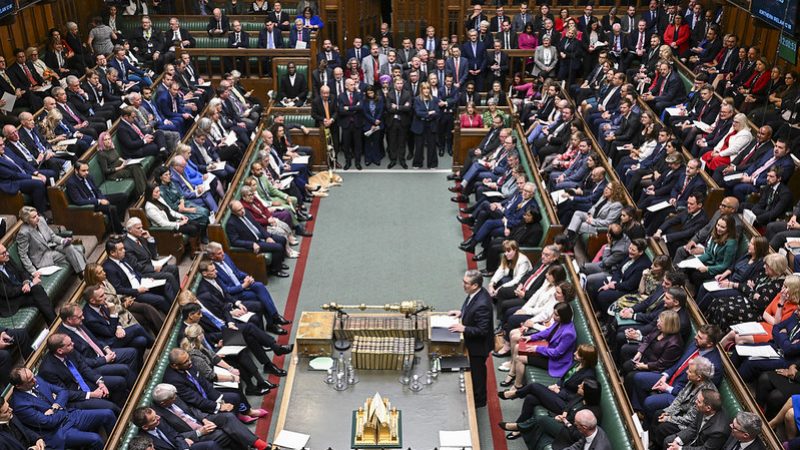
SPONSORED POST
In putting forward the Data (Use and Access Bill), published this week, the Labour government has showcased huge – albeit potentially rushed – ambition for its digital transformation plans and has recognised the role it can play in revolutionising British society.
The Bill has promised to roll out digital verification and identification services more widely to easily access essential services including verification for employers, housing providers and banking.
Such services could make our public services and day-to-day lives more seamless – however, the government has also acknowledged that digital technologies carry a multitude of potential harms. And this is no more true than when we discuss digital identification.
Ministers – including Science Secretary Peter Kyle – have rightly spoken of the need to balance transformation with risk, something which comes with no easy solution. Especially after the Summer just gone, trust has to be rebuilt with the British public, and social cohesion must be upheld for any form of digital governance to be implemented.
READ MORE: Budget: Minister says ‘normal’ for cabinet to seek good deal for departments amid unrest over cuts
But we – and the Labour government – must acknowledge that particular members of society feel this technological impact more acutely than others and have lower levels of trust as a resultThis Bill therefore cannot be rushed.
Minorities are often excluded from technological development
There is a plethora of evidence that minoritised people, in particular, are often excluded from the development of technology. We also only have to look at the racist riots this summer, triggered by social media misinformation, to see how tech, if used poorly, can disproportionately impact these communities.
The widespread condemnation of the riots will have made ministers now, more than ever, aware of the need for tackling digital exclusion and constructing inclusive digital strategies.
It is within this context that digital identity, a matter which has never failed to attract significant debate and concern, will become a much bigger conversation over the next months; and historically excluded communities must be a part of it.
People of colour are particularly worried about digital ID
That is why we at Careful Industries, supported by leading organisations and economists including Amnesty International, launched new research and recommendations last month on making digital ID work for everyone. Our new research shows fresh evidence of concern especially amongst people of colour and younger people, and sustained divides in opinion.
Among communities of colour, concern is particularly prevalent with 60% of Black and 66% of Asian respondents expressing concern that digital ID could impact civil freedoms, as well as 53% of people from both groups expressing concern over the impact that digital technologies have on people’s freedoms.
This concern was also shared amongst young people in our research: 60% of 18-24 year olds and 61% 25-34 year olds expressed concern about discrimination caused by lack of access to suitable ID and more than 50% of both age groups agreeing that digital ID could enable police discrimination.
READ MORE: Labour’s Budget 2024: What policies could Rachel Reeves announce?
Conversely, older Britons appear to view digital ID through a different lens. People over 65 are more likely than others to see it as a useful tool for enforcing law and order, highlighting the generational divide in attitudes toward this technology.
And importantly – across all Britons – only 30% would trust big tech giants to take charge of these verification services and only a quarter want to leave it up to smaller tech companies; this is significant, as the Bill speaks to harnessing private support.
Digital technologies must not compromise on civil liberties
The implementation of digital ID in any rushed way therefore runs a risk of deepening existing inequalities and distrust, which could harm the government’s agenda to restore trust between communities and build societal cohesion.
If the government is to make digital inclusion a priority, digital technologies must not compromise on civil liberties and freedoms – and must take on board the possible warnings in our research.
As we look more deeply at the Data Bill, this debate will rumble on. No doubt, the government will consider and consult with a flurry of voices. Ours will be amongst those, alongside a multitude of communities.
We will push the Labour government to demonstrate a cross-departmental strategy that considers community and monitors cohesion in any rollout of digital ID, and to put marginalised and minoritised communities at the heart of a debate they are so often shut out of – an objective the Labour movement has for its entire history, of course, sought to achieve.
SHARE: If you have anything to share that we should be looking into or publishing about this story – or any other topic involving Labour– contact us (strictly anonymously if you wish) at [email protected].
SUBSCRIBE: Sign up to LabourList’s morning email here for the best briefing on everything Labour, every weekday morning.
DONATE: If you value our work, please donate to become one of our supporters here and help sustain and expand our coverage.
PARTNER: If you or your organisation might be interested in partnering with us on sponsored events or content, email [email protected].




More from LabourList
‘Labour’s quiet quest for democratic renewal’
‘Labour promised to make work pay. Now it must deliver for young people’
‘Council Tax shouldn’t punish those who have the least or those we owe the most’